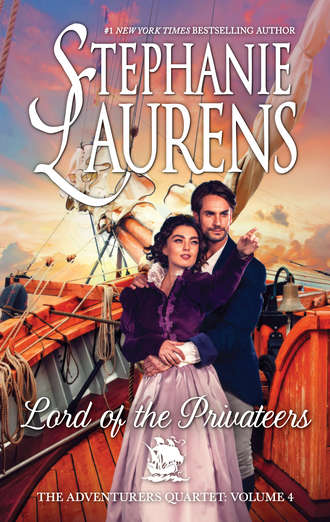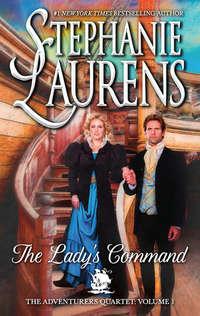
Полная версия
Lord Of The Privateers
Isobel’s gaze grew unfocused. She weighed the offer, then—determinedly and defiantly—shook her head.
“No.” Her jaw set, and she refocused on his face. “I have to go myself.” She hesitated, then grudgingly confided, “Iona needs me to go.”
Eight years had passed since they’d spoken about anything other than business. After the failure of their handfasting, she’d avoided him like the plague, until the dual pressures of him needing to work with the Carmichael Shipyards to implement the innovations he desperately wanted incorporated into the Frobisher fleet and the economic downturn following the end of the wars leaving her and her father needing Frobisher Shipping Company work to keep the shipyards afloat had forced them face-to-face again.
Face-to-face across a desk with engineering plans and design sheets littering the surface.
The predictable fact was that they worked exceptionally well together. They were natural complements in many ways.
He was an inventor—he sailed so much in such varying conditions, he was constantly noting ways in which vessels could be improved for both safety and speed.
She was a brilliant designer. She could take his raw ideas and give them structure.
He was an experienced engineer. He would take her designs and work out how to construct them.
Against all the odds, she managed the shipyards and was all but revered by the workforce. The men had seen her grow from a slip of a girl-child running wild over the docks and the yards. They considered her one of their own; her success was their success, and they worked for her as they would for no other.
Using his engineering drawings, she would order the workflow and assemble the required components, he would call in whichever ship he wanted modified, and magic would happen.
Working in tandem, he and she were steadily improving the performance of the Frobisher fleet, and for any shipping company, that meant long-term survival. In turn, her family’s shipyards were fast gaining a reputation for unparalleled production at the cutting edge of shipbuilding.
Strained though their interactions remained, professionally speaking, they were a smoothly efficient and highly successful team.
Yet through all their meetings in offices or elsewhere over recent years, she’d kept him at a frigidly rigid distance. She’d never given him an opportunity to broach the subject of what the hell had happened eight years ago, when he’d returned from a mission to have her, his handfasted bride whom he had for long months fantasized over escorting up the aisle, bluntly tell him she didn’t want to see him again, then shut her grandmother’s door in his face.
Ever since, she’d given him not a single chance to reach her on a personal level—on the level on which they’d once engaged so very well. So intuitively, so freely, so openly. So very directly. He’d never been able to talk to anyone, male or female, in the same way he used to talk to her.
He missed that.
He missed her.
And he had to wonder if she missed him. Neither of them had married, after all. According to the gossips, she’d never given a soupçon of encouragement to any of the legion of suitors only too ready to offer for the hand of the heiress who would one day own the Carmichael Shipyards.
It had taken him mere seconds to review their past. Regardless of that past, she stood in his office prepared to do battle to be allowed to spend weeks aboard The Corsair.
Weeks on board the ship he captained, during which she wouldn’t be able to avoid him.
Weeks during which he could press her to engage in direct communication, enough to resolve the situation that still existed between them sufficiently for them both to put it behind them and go on.
Or to put right whatever had gone wrong and try again.
In response to his silence, her eyes had steadily darkened; he could still follow her thoughts reasonably well. Of all the females of his acquaintance, she was the only one who would even contemplate enacting him a scene—let alone a histrionically dramatic one. One part of him actually hoped...
As if reading his mind, she narrowed her eyes. Her lips tightened. Then, quietly, she stated, “You owe me, Royd.”
It was the first time in eight years that she’d said his name in that private tone that still reached to his soul. More, it was the first reference she’d made to their past since shutting Iona’s door in his face.
And he still wasn’t sure what she meant. For what did he owe her? He could think of several answers, none of which shed all that much light on the question that, where she was concerned, filled his mind—and had for the past eight years.
He wasn’t at all sure of the wisdom of the impulse that gripped him, but it was so very strong, he surrendered and went with it. “The Corsair leaves on the morning tide on Wednesday. You’ll need to be on the wharf before daybreak.”
She searched his eyes, then crisply nodded. “Thank you. I’ll be there.”
With that, she swung on her heel, marched to the door, opened it, and swept out.
He watched her go, grateful that she hadn’t closed the door, allowing him to savor the enticing side-to-side sway of her hips.
Hips he’d once held as a right as he’d buried himself in her softness...
Registering the discomfort his tellingly vivid memories had evoked, he grunted. He surreptitiously adjusted his breeches, then rounded the desk, crossed to the door, and looked out.
Gladys Featherstone stared at him as if expecting a reprimand.
He beckoned. “I’ve orders for you to send out.”
He retreated to his desk and sank into the chair behind it. He waited until Gladys, apparently reassured, settled on one of the straight-backed chairs, her notepad resting on her knee, then he ruthlessly refocused his mind and started dictating the first of the many orders necessary to allow him to absent himself from Aberdeen long enough to sail to Freetown and back.
To complete the mission that Melville, First Lord of the Admiralty, had, via Wolverstone, requested him to undertake.
And to discover what possibilities remained with respect to him and Isobel Carmichael.
* * *
Dawn wasn’t even a suggestion on the horizon when Isobel stepped onto the planks of Aberdeen’s main wharf. In a traveling gown of bone-colored cambric with a fitted bodice, long, buttoned sleeves, and full skirts, with a waist-length, fur-lined cape over her shoulders, she deemed herself ready to sail. A neat bonnet with wide purple ribbons tied tightly beneath her chin, soft kid gloves, and matching half boots completed her highly practical outfit; she’d sailed often enough before, albeit not usually on such a long journey.
She paused to confirm that the five footmen, between them carrying her three trunks, were laboring in her wake, then she turned and strode on.
Flares burned at regular intervals, their flickering light dancing over the scene. The smell of burning pitch and the faint eddies of smoke were overwhelmed by the scent of the sea—the mingled aromas of brine, fish, damp stone, sodden wood, and wet hemp.
The Frobisher berths were already abustle—a veritable hive of activity. Stevedores lumbered past with kegs and bales balanced on their shoulders, while sailors bearing ropes, tackle, and heavy rolls of canvas sail clambered up gangplanks. Accustomed to the noise—and the cursing—she shut her ears to the crude remarks and boldly walked toward the most imposing vessel, a sleek beauty whose lines she knew well. The Corsair was one of two Frobisher vessels making ready; over the gunwale of the company’s flagship, Isobel spied Royd’s dark head. She halted and studied the sight for an instant, then turned and directed her footmen to deliver her trunks into the hands of the sailors waiting by The Corsair’s gangplank.
She was unsurprised when, on noticing her, the sailors leapt to assist. All the men on the wharf and on the nearby ships knew her by sight, much as they knew Royd. Throughout their childhoods, he and she had spent countless hours in these docks and the nearby shipyards. At first unacquainted with each other, they’d explored independently, although Royd had often been accompanied by one or more of his brothers. In contrast, she had always been alone—the only child of a major industrialist. In those long-ago days, these docks had been Royd’s personal fiefdom, while the shipyards had been hers.
In that respect, not much had changed.
But when Royd had hit eleven and his interest in shipbuilding had bloomed, he’d slipped into the shipyards and stumbled—more or less literally—over her.
She’d been a tomboy far more interested in the many and varied skills involved in building ships than in learning her stitches. Although she’d initially viewed Royd’s incursion into her domain with suspicion and a species of scorn—for she’d quickly realized he hadn’t known anywhere near as much as she had—he’d equally quickly realized that, as James Carmichael’s only child, she had the entree into every workshop and vessel in the yards, and no worker would ignore her questions.
Despite the five years that separated them—an age gap that should have prevented any close, long-term association—from that moment, Royd had dogged her footsteps. And once she’d realized that, as the eldest Frobisher brother, he had access to the entire Frobisher fleet, she had dogged his.
From the first, their relationship had been based on mutual advancement—on valuing what the other brought in terms of knowledge and the opportunity to gain more. They’d both been eager to go through the doors the other could prop wide. They’d complemented each other even then; as a team, a pair, they’d enabled each other to intellectually blossom.
They’d encouraged each other, too. In terms of being single-minded, of being driven by their passions, they were much alike.
They still were.
Isobel watched her trunks being ferried aboard and told herself she should follow them. This was what she’d wanted, what was necessary—her traveling with Royd to Freetown so she could fetch Katherine back. That was what was important—her first priority. Her second...
When she’d informed Iona of her intention to ask Royd to take her to Freetown—to browbeat him into it if she had to—Iona had looked at her for several seconds too long for comfort, then humphed and said, “We’ll see.” When she’d returned from Royd’s office and told Iona of her success, her grandmother had scrutinized her even more intently, then said, “As he’s agreed, I suggest you use the hiatus of the journey there and, if necessary, the journey back to settle what’s between you.”
She’d opened her mouth to insist that there was nothing to settle, but Iona had silenced her with an upraised hand.
“You know I’ve never approved of him. He’s ungovernable—a law unto himself and always has been.” Iona had grimaced and clasped her gnarled hands on the head of her cane. “But this state you’re both in—as if a part of your life has been indefinitely suspended—cannot go on. Neither of you have shown the slightest inclination to marry anyone else. For both your sakes, you and he need to settle this before you become too set in your ways—I wouldn’t want that for the Frobishers any more than I would wish it for you. Living your life alone isn’t a state to aspire to. The pair of you, together, need to decide what is and what isn’t, accept that reality, and then move on from there.”
Iona had held her gaze, and Isobel hadn’t been able to argue. Despite settling things between Royd and her being much easier said than done, she had to acknowledge that Iona had it right—for multiple reasons, the current situation couldn’t go on.
But Iona’s reaction to Royd agreeing—and when Isobel had reviewed the exchange, she’d realized he’d agreed without any real fuss—had raised the question of why he had. Did he have some ulterior motive in mind with respect to her? Just because she’d seen no sign of any such ambition on his part didn’t mean it wasn’t there—not with Royd.
She glanced up at the ship, then nodded a dismissal to the waiting footmen, hauled in a breath as if strengthening invisible shields, raised her skirts, and started up the gangplank. She couldn’t understand why Royd hadn’t married someone else; once he did, her way forward would be clear. But he hadn’t, so now she was faced with the necessity of exorcising their past and putting it to rest once and for all.
That was her secondary objective for this trip—to kill off the hopes that haunted her dreams and prove to her inner, still-yearning self that there truly was no hope of any reconciliation between them.
He’d handfasted with her, warmed her and her bed for three weeks, then disappeared on some voyage for the next thirteen months with no word beyond his initial assurance that the trip would take a few months at most.
And then, without warning or explanation, he’d returned.
He’d expected her to welcome him with open arms.
Needless to say, that hadn’t happened—she’d told him she hadn’t wanted to see him again and had shut the door in his too-handsome face.
“Handsome is as handsome does”—one of Iona’s maxims. To Isobel’s mind, she’d lived that, and as witnessed by the past eight years, it hadn’t gone well. But for some godforsaken reason, her fascination with Royd had still not died. She needed to use this journey to convince that naive, yearning self who had once loved him with all her heart that Royd Frobisher was no longer the man of her dreams.
She needed to use this journey to eradicate every last vestige of buried hope.
To extinguish the kernel of her once-great love.
She’d been walking upward with her eyes on the wooden plank. She reached the gap in the ship’s side, raised her head—and looked into Royd’s face. The very same face she would dearly love to strip of its power over her witless senses.
She was a long way from succeeding in that. Her heart performed a silly somersault, and her nerves came alive simply because he was close.
Then he added to her difficulties by extending his hand.
She was quite sure he did it on purpose, to test her. To try, in his usual challenging way, to discover what she intended on the voyage—whether she would insist on the rigid distance she preserved while sailing with him when testing their latest innovation or whether she was going to acknowledge that this voyage was different. That this was personal, not professional.
In for a penny, in for a pound. If she was going to use the journey to resolve what lay between them, she might as well start as she meant to go on.
Steeling her nerves and every one of her senses, she placed her gloved fingers across his palm—and clamped down on her reaction as his fingers closed firmly—possessively—over hers.
“Welcome aboard, Isobel.” Inclining his head, he handed her down to the deck.
He released her, and she could breathe again. She nodded regally. “Again, thank you for agreeing to let me sail with you.” She raised her gaze and met his. “I know you didn’t have to.”
A quirk of his black brows spoke volumes.
“Capt’n—” Royd’s quartermaster, who’d been backing toward them while relaying orders to crew in the rigging, swung around, saw her, grinned, and bobbed his head. “Miss Carmichael. Always a pleasure to have you aboard, miss.”
“Thank you, Williams.” She knew and was known to all of Royd’s crew; all had sailed with him for years. She glanced at Royd. “I’ll get out of your way.”
He waved to the stern deck. “If you want to remain on deck until we’re at sea, you’ll be least in the way up there.”
She assented with a nod and walked to the ladder. Royd followed, but he knew her well enough to allow her to climb unaided; she was more than accustomed to going up and down ladders while wearing skirts.
She felt his gaze on her back until she gained the upper deck. She stepped away from the ladder, then glanced back and down. Royd had already returned to Williams, and they were discussing which sails Royd thought to deploy for sailing out of the harbor.
Once they hit the open seas, he’d fly most of his canvas, but negotiating the exit from the basin and the mouth of the Dee required a fine touch and much less power. Courtesy of the improvements she and Royd had made, when under full sail, The Corsair was the fastest ship of her class afloat—another reason she’d petitioned him to take her to Freetown. Quite aside from the assured speed, she was eager to see how the alterations she’d tested only on short forays into the North Sea performed on a much longer journey.
Lifting her gaze from Royd’s dark head, she looked along the main deck. From all she could see, they were almost ready to cast off.
Turning, she saw Liam Stewart, Royd’s lieutenant, standing ready at the wheel. He glanced her way and smiled.
She smiled back and nodded. “Mr. Stewart.”
“Miss Carmichael—welcome aboard. I hear you’re sailing south with us all the way to Africa.”
“Indeed. I have business in Freetown.” She realized that where Royd had been, so, too, had Stewart. “I take it you’ve visited the settlement before.”
Stewart nodded. “We’ve sailed into the harbor there several times, but not in the past...it must be four years.” He cast her an apologetic glance. “Being a relatively new settlement, it will have changed significantly since last we were there.”
She grimaced, but Stewart wasn’t the man who would be by her side when she ventured into the settlement in search of her cousin.
“I need to run through the checks on the rudder. Royd and I normally do that together, but”—Stewart nodded down the ship—“he’s busy resetting those rigging lines. Would you like to stand in for him?”
“Nothing would give me greater pleasure.” She walked purposefully toward him. Meeting his widening eyes, she smiled sweetly and reached for the wheel. “But if you think I’m going to be the one hanging over the stern, you’re sadly mistaken.”
He grinned sheepishly and surrendered the wheel. While she swung the wheel, halting at the usual positions, he checked that the rudder responded freely and swung to the correct angle.
By the time they were done, Royd was calling for the lines to be cast off. He strode down the deck and came up the ladder in rapid time. Straightening, he saw her standing behind the wheel.
She savored his blink of surprise—then she stepped aside and gestured to the vacated position. “Your wheel is yours, Captain.”
He cast her a look as he strode forward, but the instant his hand touched the polished oak, his focus shifted. One glance confirmed that the lines had been freed. He glanced at Stewart as he came to stand by the rail on the other side of the wheel. “Very well, Mr. Stewart—let’s get under way.”
Stewart grinned. “Aye, aye, Captain.”
Isobel gripped the rail and watched as, with Stewart acting as his spotter, Royd eased The Corsair from her berth, working with only a jib.
As he feathered past the ships anchored in the basin, he called up more sail, but gave the canvas only enough play to have the hull gliding forward. Then they were through the narrows and turned, and the mouth of the Dee lay ahead, unobstructed by any other vessel, and Royd called for full mainsails. Topsails and topgallants followed in rapid order, then he called for the royals...and the ship lifted.
Literally lifted as the wind caught the unfurling sails and powered the vessel on.
Feeling the wind buffeting her bonnet, Isobel pushed it back so it lay across her nape, the better to appreciate the ineluctable thrill of speed.
And yet more speed as the skysails unfurled.
She listened with half an ear to the rapid-fire instructions as this sail was drawn in, that eased, and the ship, now well out from the shore, heeled to the south.
She couldn’t stop smiling.
As he had several times since they’d left the wharf, Royd glanced at Isobel’s face—let his eyes drink in the sheer joy displayed there, openly, for anyone to see. Emotionally, it was like looking into a mirror; this was something they’d always shared and patently still did—this love of the sea, of racing over the waves, of harnessing the wind and letting it have them.
Yet another strand in the net that still linked them.
Usually on a voyage, after steering the ship past the river mouth and into the ocean swells, once he felt the hull riding smoothly and was satisfied with the set of the sails, he would hand the wheel over to Liam, who normally stood the first watch from port. Today, when his lieutenant sent him a questioning look, he shook his head and remained where he was, with his hands on the wheel and Isobel beside him.
When she sailed with him during the testing of their improvements, she rarely stood anywhere near him; if she came up to the stern deck, she would stand at one rear corner where, from his position at the wheel, he couldn’t see her.
So although she’d sailed with him often in recent years, this was different. He wanted to prolong the moment, to wallow in the connection, in the shared passion that still linked them, in the magic that still reached to their souls. To experience again the mutuality of the sensitivity that had them glorying at the feel of the wind in their hair and of the deck surging beneath their feet.
She didn’t look at him—he would have felt her gaze—so he looked at her frequently. He drank in her delight and felt the same joy move through him—and felt closer to her than he had in years.
Patently, this element of their togetherness was still there, alive and very real, strong, and apparently immutable.
If this aspect of their long-ago connection—the plethora of shared needs and desires that had urged them to the altar and seen them handfasted—had survived the years unchanged...what else remained?
He had to wonder—and wonder, too, about the past eight years of being so very definitely apart.
Why had she turned from him?
And why had he allowed it?
The latter wasn’t a question that had occurred to him before, yet...standing alongside her again, aware of all he felt for her still, it was a valid question.
Eventually, their tack took them farther from land, and he reluctantly brought the magical moment to an end. With a few words, he surrendered the wheel to Liam, stepped back, and turned to Isobel.
Instinctively, Isobel swung to face Royd; her senses leapt, and she realized remaining close had been a tactical error...then again, wasn’t this what she wanted? To explore what remained between them, put whatever that was into some more mundane context, and, hopefully, cauterize her ridiculous sensitivity to his nearness. She couldn’t retrain her senses if she didn’t allow herself to dally close to him.
That said...she pushed away from the railing. “Perhaps someone can show me to my cabin?” From long experience, she knew that the only way to deal with Royd was not just to keep the reins in her hands but to use them.
His face was always well-nigh inscrutable; she could read nothing from his expression as he inclined his head. “Of course.” He waved her to the ladder.
She walked across, turned, and went quickly down.
He followed and dropped lightly to the deck beside her.
She’d assumed he would summon one of his men—his steward, Bellamy, for instance—and consign her into their care. Instead, he stepped to the companionway hatch, pulled it open, and waved her down. “I’ve moved my things out of the stern cabin. It’s yours for the duration.”
“Thank you.” With a haughty dip of her head, she went down the stairs. She stepped into the corridor and started toward the stern. “What cabin are you using?”
Having worked on The Corsair over the past years, she knew the ship’s layout. Unlike most vessels of this class, Royd’s personal ship had fewer cabins, but each cabin was larger; his captain’s cabin took up the entire width of the stern and was unusually deep.
“I’ve taken the cabin to the right.”
The captain’s cabin had doors connecting to the cabins on either side, creating a multi-roomed stateroom. She’d gathered such spaciousness and the luxurious fittings were a reflection of the quality of passenger Royd occasionally ferried to and fro; he rarely did anything without calculation and some goal in mind.









